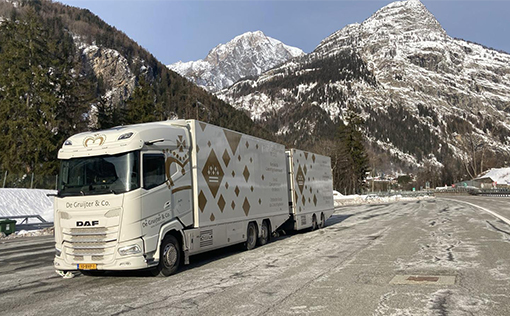
Royal de Gruijter has been a trusted moving company in the Netherlands since its establishment in 1881. And for over ten years, it has transported the world-class instruments of the Royal Concertgebouw Orchestra on tour.
Working with the orchestra to reach sustainability goals
In early 2020, the Orchestra approached Royal De Gruijter to work on a new goal: making their tours more sustainable. At the centre of this was a request to use biodiesel, specifically Hydro Vegetable Oil (HVO), to power the Royal De Gruijter van dedicated to transporting the orchestra’s instruments. This type of fuel is made from renewable crops. It reduces carbon dioxide (CO2) emissions by 90% and lowers emissions of nitrogen oxide, particulate matter, and carbon monoxide.
The project was delayed due to the pandemic, but the mission finally got underway with a trial run during one of the orchestra’s recent tours. Starting in Germany and venturing into Southeastern Europe, the tour allowed Royal De Gruijter to explore how feasible it is to run their vehicles on biodiesel over long distances. Since then, depending on the availability of biofuel stations, Royal De Gruijter uses biodiesel whenever the orchestra requests it.
Looking ahead to lower carbon footprint
Noble Mobility, the Netherlands-based Mobilitas umbrella organisation that encompasses Royal De Gruijter, is now exploring how to become more sustainable in its all its activities, beyond the work it does for the orchestra. The group has its own sustainability committee, comprising representatives from all its sub-companies.
“As a group, we are always thinking about our sustainability efforts. [Teaming up with the Royal Concertgebouw Orchestra] has helped us rethink what we need to do next,” said CEO, Edwin Ooms, “It is always at the forefront [of our minds] to do something good for the environment and people.”
Ooms is also a member of the Mobilitas Environmental, Social, and Governance (ESG) Committee. “In the Netherlands, there are roadmaps for the years ahead that outline what different Dutch municipalities will require in terms of sustainability, and we need to abide by that. As such, we also need a plan.”
Converting to cleaner energy brings challenges
Converting the whole Noble Mobility fleet to biofuel is being considered for the near future, but there are challenges. While their convoy features many of the latest generation vehicles that can switch between standard and biodiesel, the number of HVO fuel stations is limited.
Royal De Gruijter’s Managing Director, Remko Hitijahubessy, explained: “We travel all over Europe and biodiesel is not available everywhere yet. This means that routes must be planned carefully so that we can use HVO for the entire journey. That’s not always efficient, or even possible.”
Another challenge is the increased cost and how to communicate it to clients. HVO is at least 10% more expensive than ordinary diesel. Ooms says they need solid data that proves their reduced carbon emissions. Clients can then potentially use this for improving their own sustainability efforts.
“Because of biofuel availability, we won’t be able to guarantee that all trips will be green, but [hopefully sometime soon] we can guarantee HVO-fuelled vehicles for about 70% of our trips,” he added.
Across Europe, transport companies are slowly shifting to more sustainable energy sources, and Noble Mobility wants to be ahead of the game. As such, the company is also testing other sustainable transport options, such as electric-powered and hydrogen-fuelled vans.
These operate in a smaller radius compared to the long-range HVO trucks but might be suitable for intracity work.
“[Soon using cleaner energy] won’t be a key differentiator; it will be the norm. So, it’s important for us to explore all the options and have a strategy,” said Remko, “Also because the transition will have knock-on effects on our operations.”
“So many elements in the logistics chain will be affected by the transition,” Ooms added. “But switching to sustainable energy is non-negotiable for us. It’s not a question of if we will do it, but how.”
Planning a move and want to incorporate a greener approach? Contact us to make your move more sustainable.

